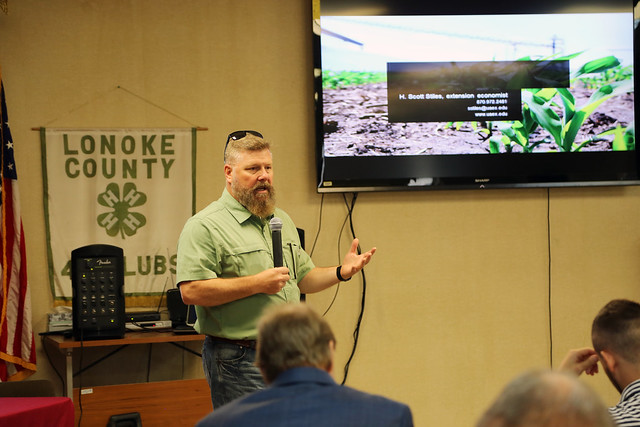Ag Roundtable: Farmers need to diversify; reduce reliance on China as a customer
By Mary Hightower
U of A System Division of Agriculture
July 29, 2019
Fast facts:
- Farmers need to reduce reliance on China as a market
- As Market Facilitation Program signup period begins, farmers warned not to see payments as permanent
(490 words)
(Newsrooms – With additional art at https://flic.kr/s/aHsmFBEjnz )
(Download this story in MS Word format here.)
LONOKE, Ark. – An agricultural roundtable on Monday presented two key takeaways for farmers: find ways to reduce their reliance on China as a market, and don’t count on Market Facilitation Program payments to become permanent.
About three dozen people attended the round table at the Lonoke Extension Center, which featured an economic overview by Scott Stiles, extension economist for the University of Arkansas System Division of Agriculture, and a presentation by U.S. Rep. Rick Crawford.
Stiles explained that 2018 began with optimism about soybean prices, but a record crop in Brazil, compounded by China’s 25 percent tariffs on U.S. products, led to large ending stocks of soybeans and a drop in prices.
“U.S. carryover is starting to build. You are witnessing something historic here,” Stiles said. “The U.S. Department of Agriculture estimates just over a billion bushels. Ultimately, we could see that number go to 1.1 billion, maybe as soon as the August report comes in.”
With the advent of tariffs, soybean sales to China were down 508 million bushels; sorghum was down 155 million bushels and cotton was down 901,000 bales.
Outbreaks of African swine fever — now reported in China, Cambodia, Vietnam and Europe — may reshape the world’s soybean markets even more than tariffs, however. The disease is incurable and has an almost 100 percent mortality rate. Stiles said one projection forecasts some 200 million pigs to be culled due to the disease.
“Culling is expected to reduce Chinese soybean demand up to 22 million tons, or 21 percent,” he said. “That could have more of an impact on soybean demand than the tariffs themselves.”
The bottom line, Stiles said, is that farmers have to ask themselves, “what can we do to diversify and be less reliant on China?” And it’s a long-haul game. “Some argue it may take many years to restore trade to China.”
Market Facilitation Program
Monday was the first day of the signup period for Market Facilitation Program payments (See: http://bit.ly/2GsEtvN), and while he said the 2018 MFP payments were great for filling gaps left by Agricultural Risk Coverage and Price Loss Coverage payments under the 2014 Farm Bill, Stiles urged caution: “Don’t expect MFP to become a permanent part of your cash flow.”
Crawford underscored Stiles’ points, saying MFP “is a Band-aid.” He said his office had received several calls about MFP, especially over the differences in county rates. However, he said that this year was “more fair than it was administered last year.”
The congressman also urged farmers to “be looking at ways to increase domestic consumption of our commodities.
“We need to diversify our portfolio, our crop mix. Relying on the Chinese marketplace to do business, you do at your own peril,” Crawford said, adding that other markets in Asia, such as Malaysia, India, Singapore and Vietnam were starting to look good.
For more information about agricultural economics, visit www.uaex.uada.edu or contact your county extension office. Follow us on Twitter at @AR_Extension.
About the Division of Agriculture
The University of Arkansas System Division of Agriculture’s mission is to strengthen agriculture, communities, and families by connecting trusted research to the adoption of best practices. Through the Agricultural Experiment Station and the Cooperative Extension Service, the Division of Agriculture conducts research and extension work within the nation’s historic land grant education system.
The Division of Agriculture is one of 20 entities within the University of Arkansas System. It has offices in all 75 counties in Arkansas and faculty on five system campuses.
The University of Arkansas System Division of Agriculture is an equal opportunity institution. If you require a reasonable accommodation to participate or need materials in another format, please contact the station at 501-671-2229 as soon as possible. Dial 711 for Arkansas Relay.
# # #
Media Contact: Mary Hightower
Dir. of Communication Services
U of A System Division of Agriculture
Cooperative Extension Service
(501) 671-2126
mhightower@uada.edu
